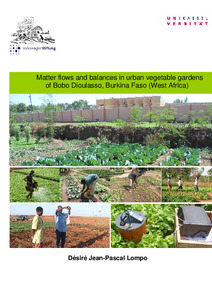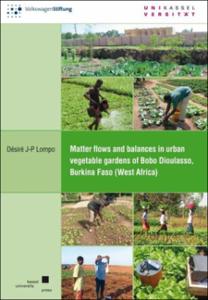| dc.date.accessioned | 2012-07-30T08:54:25Z | |
| dc.date.available | 2012-07-30T08:54:25Z | |
| dc.date.issued | 2012-07-30 | |
| dc.identifier.uri | urn:nbn:de:hebis:34-2012073041537 | |
| dc.identifier.uri | http://hdl.handle.net/123456789/2012073041537 | |
| dc.description | Zugl.: Kassel, Univ., Diss. 2012 | |
| dc.description.sponsorship | Volkswagen Foundation (VolkswagenStiftung), Hannover (Germany) | ger |
| dc.language.iso | eng | |
| dc.publisher | kassel university press | |
| dc.rights | Urheberrechtlich geschützt | |
| dc.rights.uri | https://rightsstatements.org/page/InC/1.0/ | |
| dc.subject | Nutrient management | eng |
| dc.subject | Urban agriculture | eng |
| dc.subject.ddc | 630 | |
| dc.title | Matter flows and balances in urban vegetable gardens of Bobo Dioulasso, Burkina Faso (West Africa) | eng |
| dc.type | Dissertation | |
| dcterms.abstract | Many efforts are undertaken for sustaining urban agriculture in African cities. This study therefore investigated nutrient management practices in urban vegetable gardens of Bobo Dioulasso, Burkina Faso (West Africa). Nitrogen (N), phosphorus (P), potassium (K), and carbon (C) fluxes were quantified and nutrient balances calculated for three gardens representing the typical commercial gardening + field crops and livestock system (cGCL) and three gardens representing the commercial gardening + semi-commercial field crop system (cGscC). Nutrient and C balances were similarly positive in both production systems reaching annual averages of 688 kg N ha -1, 251 kg P ha-1 yr-1, 189 kg K ha-1, and 31 t C ha-1. Inputs in all gardens exceeded the amounts recommended by the extension service. Gaseous emissions of N and C represented important pathways of N and C losses. The highest emission rates occurred during the hottest periods of the day and the peaks were observed after fertilizer applications. Management recommendations should be geared towards increasing nutrient use efficiencies by better tailoring nutrient availability to crop demand and adjusted fertilization techniques to mitigate N losses. | eng |
| dcterms.accessRights | open access | |
| dcterms.creator | Lompo, Désiré Jean-Pascal | |
| dcterms.extent | 80 Seiten | |
| dc.contributor.corporatename | Kassel, Univ., Fachbereich Ökologische Agrarwissenschaften | |
| dc.contributor.referee | Buerkert , Andreas (Prof. Dr.) | |
| dc.contributor.referee | Schlecht, Eva (Prof. Dr.) | |
| dc.contributor.referee | Joergensen, Rainer Georg (Prof. Dr.) | |
| dc.contributor.referee | Nantoumé, Hamidou (Dr.) | |
| dc.description.everything | This work is part of the Urban Food Project which worked on the “Challenges and opportunities for nutrient efficient agriculture in West African cities”. Urban Food Project was a collaborative research program and a training network set up by a team of senior scientists from African (Burkina Faso, Mali, Nigeria), and European research institutions (University of Kassel; Germany, Wageningen University; The Netherlands; Université Catholique de Louvain, Belgium), and the pan-African research and training network AfNet. | ger |
| dc.relation.isbn | 978-3-89958-591-9 | |
| dc.subject.swd | Städtische Landwirtschaft | ger |
| dc.subject.swd | Burkina Faso | ger |
| dc.date.examination | 2012-02-24 | |
| kup.iskup | true | |
| kup.subject | Agrarwissenschaft und Ökologie | |
| kup.typ | Dissertation | |
| kup.binding | Softcover | |
| kup.size | DIN A5 | |


